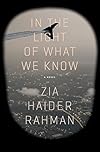Zia Haider Rahman
Author of In the light of what we know
About the Author
Zia Haider Rahman was born in Bangladesh. His debut novel, In the Light of What We Know, will be featured at the Dunedin Writers And Readers Festival in May 2015. This title also won the James Tait Black Prizes for fiction in 2015. (Bowker Author Biography)
Works by Zia Haider Rahman
In het licht van wat wij weten 2 copies
Tagged
Common Knowledge
- Gender
- male
- Nationality
- UK
- Birthplace
- Sylhet, Bangladesh
- Places of residence
- London, England, UK
- Education
- Balliol College, Oxford University (Mathematics)
Cambridge University
Yale University - Occupations
- investment banker
human rights lawyer
novelist
corporate lawyer
Members
Reviews
Lists
Awards
You May Also Like
Statistics
- Works
- 2
- Members
- 525
- Popularity
- #47,377
- Rating
- 3.8
- Reviews
- 17
- ISBNs
- 28
- Languages
- 6





















There are no speech marks throughout. This both adds to the sense of closely observing a long conversation between friends and leads to confusion about who is speaking. The latter certainly emphasises the unreliability of the narration – the reader knows that Zafar is telling his friend only parts of his story, but also that the narrator’s perspective shapes his reporting of what Zafar said, did, and wrote. Despite being 550 pages long and packed with carefully described incidents, this is a remarkably ambiguous novel. Zafar remains a mystery to the narrator and the reader, while the narrator is scarcely less enigmatic himself. There is certainly a sense that you can learn a lot of detail about someone’s life without understanding them at all, as it’s impossible to say whether what you’ve been told is actually significant. Zafar and the narrator gloss over events that would be the plot focus of a different novel. Indeed, the plot is not the point at all as the novel is concerned with big social and philosophical themes: wealth, class, privilege, freedom, love, duty, ambition, and the search for meaning in life.
Although the preceding paragraphs don’t really constitute a recommendation, I did enjoy [b:In the Light of What We Know|17934468|In the Light of What We Know|Zia Haider Rahman|https://i.gr-assets.com/images/S/compressed.photo.goodreads.com/books/1372677492l/17934468._SY75_.jpg|25142330] thanks to the beautiful and often insightful writing:
Always running through the conversation between Zafar and the narrator is the frustration of any communication: how to effectively convey the subjectivity of your own experience?
This drama of the mind is what the book is trying to convey, or at least demonstrate the difficulty of conveying. The text is full of quotations from and references to books, films, aphorisms, research, etc as these are amongst the tools we use to attempt explanations of our perspectives to others. However, this perpetual quoting at each other can be a little exasperating for the reader. It often seems to obscure rather than elucidate something, again emphasising the unreliability of the narrator, of Zafar, and of consciousness in general. [b:In the Light of What We Know|17934468|In the Light of What We Know|Zia Haider Rahman|https://i.gr-assets.com/images/S/compressed.photo.goodreads.com/books/1372677492l/17934468._SY75_.jpg|25142330] also contains one of the best descriptions I’ve ever found of the flow state:
The short interview with the author included in the back of the paperback edition I read goes into the themes and context for the novel. Zia Haider Rahman’s comments are thoughtful and definitely added to my appreciation. That said, I wouldn’t unequivocally recommend [b:In the Light of What We Know|17934468|In the Light of What We Know|Zia Haider Rahman|https://i.gr-assets.com/images/S/compressed.photo.goodreads.com/books/1372677492l/17934468._SY75_.jpg|25142330] as some may find the meandering philosophical reflections, jigsaw of plot fragments, and exceedingly verbose protagonists trying. It rewards patience, but not with catharsis.… (more)